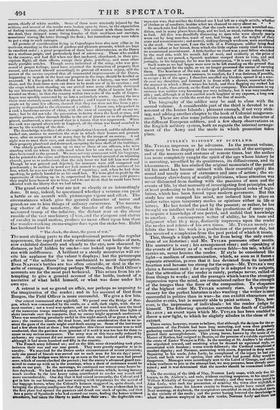TYTLER'S DI STORY OF SCOTLAND.
Mn, TYTLER improves as he advances. In the present volume, there may be less display of the curious research of the antiquary, and of the manners and customs of remote times, but the author has more completely caught the spirit of the age whose history he is narrating, unsullied by its quaintness, its diffusiveness, and its irksomeness. He has studied the original memorials of the period till his mind has become imbued with their essential spirit; the sound and manly sense of statesmen and men of action ; the ex- traordinary- shrewdness of worldly politicians, whose attention was never distracted from dealing with the passions of men and the events of life, by that necessity of investigating first principles, and at least professing to look to enlarged philosophical rules of legis- lation, which has been forced upon modern governors. But this study has not cramped his mind, nor induced him to place an undue value upon temporary modes or opinions either in life or letters. He has tested the past by the present; or rather, he has brought an intellect well versed in the productions of many ages, to acquire a knowledge of one period, and unfold that knowledge to another. A contemporary writer of ability, be his taste and judgment what thy may, distinctly impresses upon the reader the modes and colours of his own times. Mr. TYTLER merely ex- hibits the hue : his work is a production of the present day, but has received a complexion from the past period of which it treats. This, though a high quality, is far from being the only excel- lence of an historian ; and Mr. TYTLER possesses other merits. His narrative is easy ; his arrangement clear; and—speaking of the events of history as of a well-woven fable—his tale, whilst it carries on, never hurries the reader. If style be considered like light—a medium of communication, which, as soon as it force § a separate attention, proves that it has deviated from its intended function and become too strong for the organ—Mr. TYTLER'S may claim a foremost rank ; for so equally is it adapted to its subjects, that the attention of the reader is rarely, perhaps never, called off from things to words ; and the passages which leave the strongest impression upon the mind, are remembered rather for the strength of the images than the force of the composition. To eloquence of the highest order Mr. TYTLER scarcely rises. A quality ne- cessary for the perfect historian is also wanting : the writer is more successful in politics than in war—he can exhibit characters and describe events, but is scarcely able to paint actions. This, My- ever, is the impression of individuals: let the reader judge for himself. The following quotation narrates the death of Cardinal BEsTorr ; an event upon which Mr. TYTLER has been enabled to throw a new light, to which he slightly alludes in the close of the extract.
There seems, however, reason to believe, that although the designs for the are sassination of the Prelate had been long maturing, and were thus gradually gathering round him, a private quarrel between him and Norman Lesly, preci- pitated their accomplishment. This young baron, known by the name of the Master of Rothes, had resigned to Beaton' on the promise of a valuble equivalent, the estate of Easter Wemyss in Fife. In the meeting at St. Andrew's he claimed the stipulated reward, and receiving what he deemed an equivocal reply, re- monstrated with freedom; warm words followed ; the Cardinal complained ei insulted dignity ; and Norman, answering with scorn, departed in deep wrath. Repairing to his uncle, John Lesly, he complained of the injury he lied SD*. tamed, and both were of opinion that after what had passed delay would be dangerous. Messages were accordingly sent to the Laird of Grange, and others whose readiness to join in the attempt had, we may presume, been already asceo timed; and it was determined that the murder should be committed without delay. On the evening of the 28eh of May, Norman Lasly cause, with only five fol- lowers, to St. Afidrew's, and rode, without exciting suspicion, to his usual km William Kirkaldy of Grange was there already; and they weresoon joined by John Lesly, who took the precaution of entering the town after nightfall, as his appearance, from his known enmity to Beaton, might have raised. alarm - Next morniag, at daybreak, the conspirators assembled in small detailied knout in the vicinity of the castle • and the porter having lowered the drawbridge tO admit tha masons. employed in the new works,. Nosman Lcsly and.three. Wt




















 Previous page
Previous page